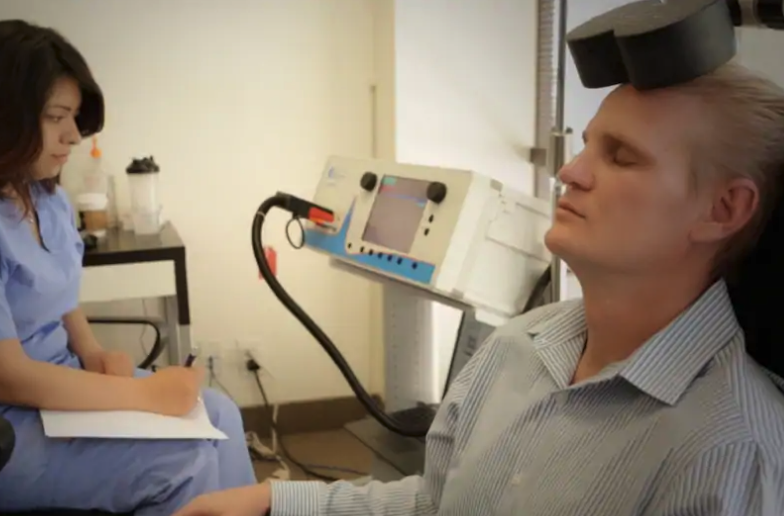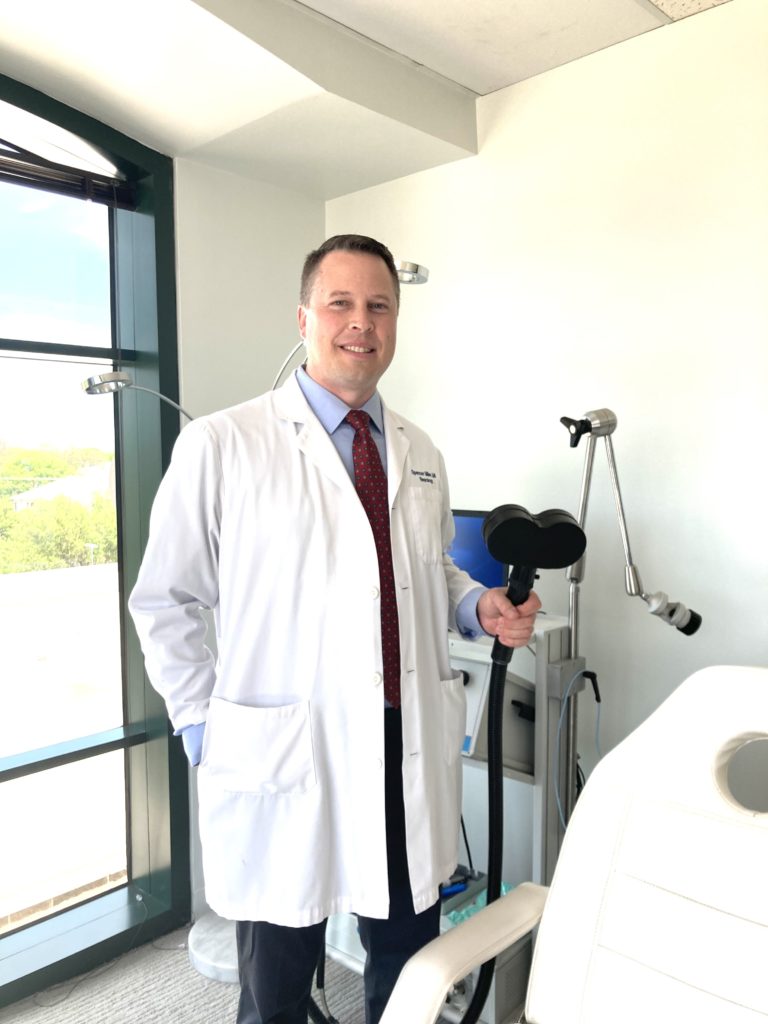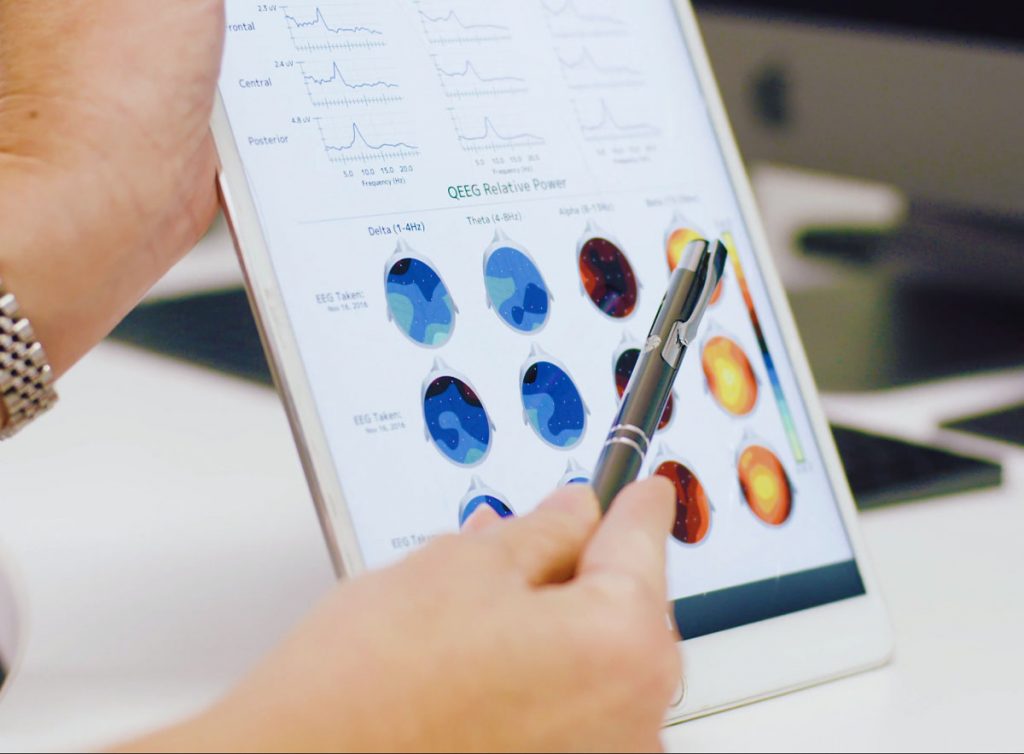A Breakthrough Treatment to Relieve PTSD Symptoms
MeRT is Drug-free, Non-invasive, and Can Help You Enjoy Life Again

New Hope for Treating Post-Traumatic Stress Disorder
Would you like to stop reliving past traumatic events? Be free of stress, anxiety, and depression? Feel you can move forward in life?
You can.
MeRT, or Magnetic e-Resonance Therapy, is non-invasive, drug-free, and lasting. And it’s had some spectacular results when treating PTSD.*
MeRT uses sophisticated diagnostics to develop a highly tailored treatment plan. Then, using gentle magnetic waves, we stimulate precisely targeted areas of your brain to relieve your symptoms.
If you suffer from PTSD, you’re not alone. According to the American Psychiatric Association, an estimated one in 11 people will be diagnosed in their lifetime.
And you may have tried many ways to treat your PTSD, such as therapy or medications, but the trauma still haunts you.
Don’t give up. MeRT could very well be your solution.
The MeRT Approach to PTSD Treatment
MeRT, or Magnetic e-Resonance Therapy, combines three procedures:
1. Transcranial Magnetic Stimulation (TMS, an FDA-cleared therapy),
2. Quantitative Electroencephalogram (qEEG), also called brain mapping, and
3. Electrocardiogram (ECG/EKG).
The EEG is key to the success of the MeRT treatment, as it provides a precise picture of a patient’s brain function. And patients with PTSD have markers that are clearly visible in their EEG studies.
The EEG can show us an imbalance in brainwave activity — and each patient will have a unique “brain map” that shows their particular imbalance.
Then, through a highly personalized treatment plan of targeted TMS, we strengthen healthy brainwave activity.
Plus, many people who experience post-traumatic stress also suffer from conditions such as depression and anxiety. MeRT treatment can effectively address those conditions as well. *


Call our New Patient Coordinator
for a Free, No-Obligation Consultation
Or fill out the Contact Form below, and we will contact you.

Could You Be Suffering from Post-Traumatic Stress Disorder?
When a person has experienced or seen a terrifying life event, they can suffer from Post-Traumatic Stress Disorder. That event may involve a real or perceived threat of injury or death, such as:
- a natural disaster like an earthquake or tornado
- military combat
- physical or sexual assault or abuse
- an accident
PTSD can also arise after exposure to trauma over a long period, such as childhood abuse or long-term abusive relationships.
PTSD can happen to anyone at any age. And having PTSD doesn’t mean you’re flawed or weak.
And while PTSD may improve with medication and therapy, 20-50% of all patients don’t respond to conventional treatments. Yet, TMS—a key component of MeRT—has shown some remarkable results.*
Benefits of MeRT Treatment for PTSD
Here are some of the many reported benefits from those who’ve received MeRT treatment for their PTSD symptoms*:
- More high-quality, longer-lasting sleep
- Improved self-confidence and self-esteem
- Fewer stress symptoms
- Decreased cravings for drugs or alcohol
- Less pain
- Better focus and concentration
- Overall mood improvement
- Better and longer attention span
- More sociability
- Increased motivation
- More emotional stability
- Better ability to adapt to change
*Results are based on strict observance of our protocols, and the benefits may be different for each patient. Results are not guaranteed.

Call our New Patient Coordinator
for a Free, No-Obligation Consultation
Or fill out the Contact Form below, and we will contact you.

Our Doctor
Spencer O Miller MD, Director of Brain Treatment Partners Oklahoma
Dr. Spencer O. Miller is a well-respected and highly esteemed neurologist who practices in both Oklahoma and Dallas, Texas,
He received his medical degree from the University of Mississippi School of Medicine and has been in practice for 15 years. He served in the US Air Force for five years, where he saw many serious head injuries and cases of PTSD and TBI (traumatic brain injury).
Dr. Miller now specializes in MeRT for the treatment of PTSD as well as autism, traumatic brain injury, depression, and many other neurological conditions.
The brain is seeking equilibrium, homeostasis, or a low energy state in which to operate. An aberrancy or dysfunction of the brain actually requires energy for the brain to kind of realign itself. And when you’re using that extra energy, it fatigues the brain. It’s very similar to nutrition: If you don’t have the right nutrition, the balance just isn’t there. We’re really seeking to balance the function of the brain.”
How MeRT Works to Treat PTSD Symptoms
MeRT is a relatively new treatment, so you may have many questions as to whether it’s the right treatment for your PTSD. We understand, and we’re here to make it as easy as possible for you to get the information you need. We also know that this is not a light decision to make.
Your first step is as simple as a phone consultation with our New Patient Coordinator. You can discuss symptoms and history, ask all the questions you want, and have her explain the treatment in full. This includes all fees and protocols.
Once you decide to take the next step, we then set up two separate appointments. Each of these appointments will last 45 minutes to an hour. After this, we have an assessment period where the actual procedure and monitoring take place.
EEG Testing

At your first appointment, we perform the qEEG and ECG/EKG. For the EEG, we place a cap on your head to measure the electrical activity in your brain. This will map out any areas which are not performing as they should. And for the EKG, we attach electrodes to your chest to record the heart’s electrical signals.
After you complete the testing, our team will carefully analyze the results. Based on this analysis, we develop a treatment plan customized to your specific condition.
Consultation

Your second appointment, after your qEEG/EKG, is a one-on-one consultation. You can do this either in person or virtually from the comfort of your home.
We will discuss your test results and treatment protocols, answer questions you may have, and let you know more about what to expect during your assessment period of treatment.
Assessment Period

We then perform a short period of treatment, followed by a new EEG to see how you are responding. We determine progress based on the new EEG results compared to the initial one and symptom improvements.
If there is a positive response to treatment during the assessment period, you will have likely noticed some improvements. At that point, we will schedule additional MeRT treatment in two-week intervals.
Continued Treatment
At the end of every two weeks, we will perform a qEEG/EKG to monitor your progress. And you will have a consultation to confirm that changes are still showing on the testing.
Most conditions treated with MeRT provide noticeable and long-lasting results after four to eight weeks of treatment; however, each patient is different, and results may vary.
Questions About MeRT? Need More Information?
Contact Our New Patient Coordinator
Our New Patient Coordinator is here to explain how MeRT can help you.
She’ll take the time to listen to your concerns, answer your questions, explain costs, and put your mind at ease.
She can also schedule your treatment if you decide to move forward.
Our goal is to help guide you through the process with quality care in a warm and compassionate environment.

Call our New Patient Coordinator
for a Free, No-Obligation Consultation
Or fill out the Contact Form below, and we will contact you.
For more information or to speak with our New Patient Coordinator, please fill in the information below.